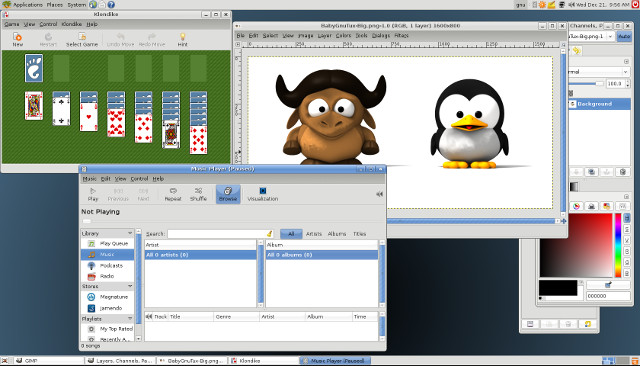GNU is the only operating system developed specifically to give its users freedom. What is GNU, and what freedom is at stake?
What is GNU?
GNU is an operating system that is free software—that is, it respects users' freedom. The development of GNU made it possible to use a computer without software that would trample your freedom.
We recommend installable versions of GNU (more precisely, GNU/Linux distributions) which are entirely free software. More about GNU below.
What is the Free Software Movement?
The free software movement campaigns to win for the users of computing the freedom that comes from free software. Free software puts its users in control of their own computing. Non-free software puts its users under the power of the software's developer. See the video explanation.
What is Free Software?
Free software means the users have the freedom to run, copy, distribute, study, change and improve the software.
Free software is a matter of liberty, not price. To understand the concept, you should think of “free” as in “free speech”, not as in “free beer”.
More precisely, free software means users of a program have the four essential freedoms:
- The freedom to run the program as you wish, for any purpose (freedom 0).
- The freedom to study how the program works, and adapt it to your needs (freedom 1). Access to the source code is a precondition for this.
- The freedom to redistribute copies so you can help your neighbor (freedom 2).
- The freedom to improve the program, and release your improvements to the public, so that the whole community benefits (freedom 3). Access to the source code is a precondition for this.
Developments in technology and network use have made these freedoms even more important now than they were in 1983.
Nowadays the free software movement goes far beyond developing the GNU system. See the Free Software Foundation's web site for more about what we do, and a list of ways you can help.
More about GNU
GNU is a Unix-like operating system. That means it is a collection of many programs: applications, libraries, developer tools, even games. The development of GNU, started in January 1984, is known as the GNU Project. Many of the programs in GNU are released under the auspices of the GNU Project; those we call GNU packages.
The name “GNU” is a recursive acronym for “GNU's Not Unix.” “GNU” is pronounced g'noo, as one syllable, like saying “grew” but replacing the r with n.
The program in a Unix-like system that allocates machine resources and talks to the hardware is called the “kernel”. GNU is typically used with a kernel called Linux. This combination is the GNU/Linux operating system. GNU/Linux is used by millions, though many call it “Linux” by mistake.
GNU's own kernel, The Hurd, was started in 1990 (before Linux was started). Volunteers continue developing the Hurd because it is an interesting technical project.
Planet GNU

Free Software Foundation member meetup (Bellingham, WA): FSF executive director John Sullivan and copyright and licensing associate Donald Robertson are going to be in Bellingham, WA, for LFNW... more
Friday Free Software Directory IRC meetup: April 28th starting at 12:00 p.m. EDT/16:00 UTC: Participate in supporting the Directory by adding new entries and updating existing ones. We will be... more
Free Software Directory meeting recap for April 21st, 2017: Every week free software activists from around the world come together in #fsf on irc.freenode.org to help improve the Free Software... more
For more news, see Planet GNU and the list of recent GNU releases.
Take Action
- Support current FSF campaigns.
- Defend privacy, and support global copyright reform with LQDN.
- Support the efforts on net neutrality in Europe, in the USA and in Canada.
- Fight against software patents: worldwide, and Europe.
- Can you contribute to any of these High Priority Areas? Free phone operating system; decentralization, federation, and self-hosting; free drivers, firmware, and hardware designs; real-time voice and video chat; encourage contribution by people underrepresented in the community, and more.
- Can you take over an unmaintained GNU package? halifax, are all looking for maintainers. Also, these packages are looking for co-maintainers: aspell, bison, gnuae, gnubik, metaexchange, powerguru, xboard. See the package web pages for more information.
Today's random package…
Tar
Tar provides the ability to create tar archives, as well as the ability to extract, update or list files in an existing archive. It is useful for combining many files into one larger file, while maintaining directory structure and file information such as permissions and creation/modification dates. GNU tar offers many extensions over the standard utility. (doc)
Try some parts of GNU
Do you use Windows or iOS? Take a first step towards freedom by installing some free software on your current operating system:
![[A GNU head]](/web/20170708083257im_/http://www.gnu.org/graphics/heckert_gnu.small.png) GNU Operating System
GNU Operating System
![[FSF logo]](/web/20170708083257im_/http://www.gnu.org/graphics/fsf-logo-notext-small.png)
![[FS gang]](/web/20170708083257im_/http://www.gnu.org/graphics/fs-gang.png)